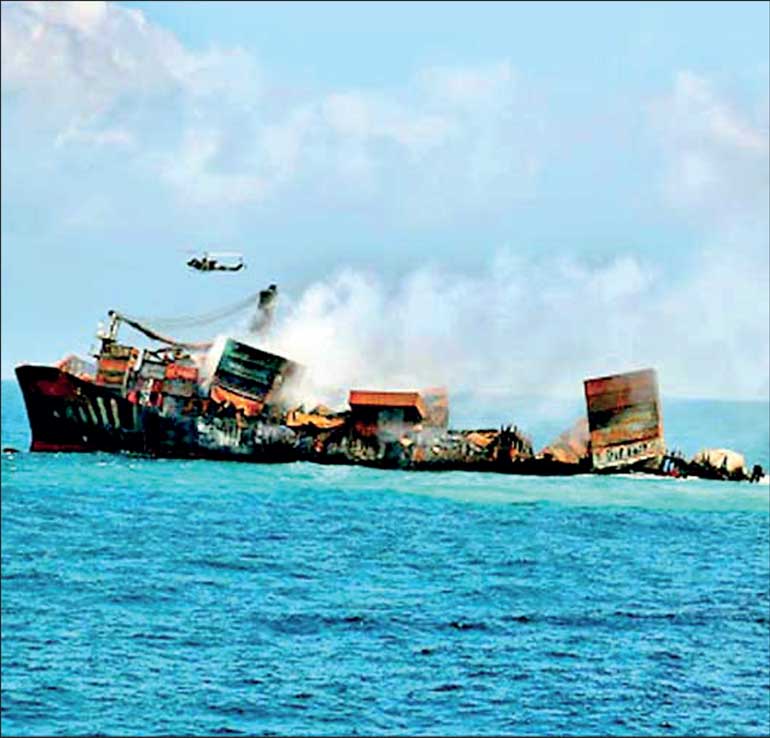Tuesday Feb 24, 2026
Tuesday Feb 24, 2026
Wednesday, 13 August 2025 00:24 - - {{hitsCtrl.values.hits}}

Given the formidable legal hurdles in Singapore, Sri Lanka’s most viable path to recovery may lie within its own borders
 In what has been hailed as a landmark environmental ruling, Sri Lanka’s Supreme Court recently ordered the operators of the MV X-Press Pearl to pay $ 1 billion in compensation for the catastrophic 2021 maritime disaster that ravaged the nation’s coastline. However, as the Sri Lankan Government prepares to enforce this judgment against the vessel’s Singapore-based operators, it faces a formidable array of legal and practical obstacles that cast serious doubt on whether the historic award will ever be collected in full.
In what has been hailed as a landmark environmental ruling, Sri Lanka’s Supreme Court recently ordered the operators of the MV X-Press Pearl to pay $ 1 billion in compensation for the catastrophic 2021 maritime disaster that ravaged the nation’s coastline. However, as the Sri Lankan Government prepares to enforce this judgment against the vessel’s Singapore-based operators, it faces a formidable array of legal and practical obstacles that cast serious doubt on whether the historic award will ever be collected in full.
The core of the challenge lies in the complex interplay between Sri Lankan constitutional law, Singaporean enforcement statutes, and entrenched principles of international maritime law. Legal experts suggest that while the judgment is a significant moral and legal victory for Sri Lanka, its journey through the Singaporean courts is likely to be fraught with difficulty, potentially rendering the billion-dollar award a pyrrhic victory.
The judgment and its unique nature
The MV X-Press Pearl, a Singapore-flagged container ship, caught fire and sank off the coast of Colombo in May 2021, spilling vast quantities of hazardous chemicals and plastic pellets, resulting in Sri Lanka’s worst-ever marine pollution event. The Supreme Court’s ruling, delivered on 24 July 2025, arose not from a conventional civil lawsuit but from fundamental rights petitions filed by citizens and environmental groups.
This constitutional origin is a critical detail. The court found that the ship’s operators, captain, and local agent had violated the fundamental rights of Sri Lanka’s citizens. The $ 1 billion award was framed as “interim compensation” under the “polluter pays” principle, with the funds payable directly to the Sri Lankan Treasury to be used for environmental remediation and economic recovery. It is this public-interest nature of the award that creates the first major hurdle to enforcement in Singapore.
Enforcing the judgment in Singapore: The REFJA gateway
Sri Lanka’s path to enforcement in Singapore is governed exclusively by the Reciprocal Enforcement of Foreign Judgments Act (REFJA). As of March 2023, Sri Lanka is a recognised reciprocating country, meaning final money judgments from its superior courts are, in principle, eligible for registration and enforcement in Singapore.
On its face, the X-Press Pearl judgment appears to meet the basic criteria: it is a final and conclusive monetary award from Sri Lanka’s highest court. However, the REFJA contains specific grounds upon which a Singaporean court must refuse to register a foreign judgment, and the X-Press Pearl operators have several powerful arguments at their disposal.
Obstacle 1: A public penalty, not a private debt
 The most significant challenge is the characterisation of the award itself. Singaporean law, like that of many common law nations, does not enforce the penal, revenue, or public laws of other countries. The REFJA explicitly excludes judgments for a “fine or other penalty” from its definition of an enforceable money judgment.
The most significant challenge is the characterisation of the award itself. Singaporean law, like that of many common law nations, does not enforce the penal, revenue, or public laws of other countries. The REFJA explicitly excludes judgments for a “fine or other penalty” from its definition of an enforceable money judgment.
The respondent, X-Press Feeders, will argue that the $ 1 billion award, payable to the State treasury and arising from a constitutional case to vindicate public rights, is substantively a penalty designed to punish and deter, rather than a civil award to compensate a private party for specific losses. A Singaporean court will look beyond the “compensation” label to the substance of the award. Given that the judgment’s purpose is to remedy a wrong against the nation and enforce environmental regulations, there is a strong likelihood it will be classified as an unenforceable foreign public law.
Furthermore, the respondent can raise a potent public policy defence. They may argue that enforcing a billion-dollar liability determined through a constitutional proceeding—which lacks the full adversarial process of a civil trial, such as cross-examination of witnesses—is contrary to Singapore’s fundamental principles of procedural fairness and natural justice.
Obstacle 2: The shadow of London’s maritime court
A separate and perhaps even more decisive obstacle is the existence of a conflicting judgment from a London admiralty court. Shortly after the disaster, the ship’s owners initiated proceedings in London under the 1976 Convention on Limitation of Liability for Maritime Claims (LLMC), an international treaty to which both the UK and Singapore are parties. This convention allows a shipowner to cap their total liability for an incident at an amount based on the vessel’s tonnage.
The London court granted a decree limiting the owner’s liability for the X-Press Pearl incident to approximately $ 25-27 million—a fraction of the Sri Lankan award. This creates a direct conflict of judgments. Under the legal principle of ‘res judicata’, a Singaporean court is highly likely to recognise the London decree as the final and conclusive determination on the issue of liability limits, especially since Sri Lankan authorities participated in those proceedings.
As a major maritime hub, Singapore has a strong interest in upholding the globally accepted LLMC regime. Enforcing the full Sri Lankan judgment would directly contravene Singapore’s own laws and treaty obligations, providing another powerful public policy reason for refusal. The Sri Lankan Supreme Court itself acknowledged this risk, noting that any action in Singapore would “likely result in a ceiling on the maximum compensation” under the convention.
Obstacle 3: The corporate shield and insolvency
Another practical challenge lies in the corporate structure of the liable parties. While the Sri Lankan judgment held multiple entities jointly and severally liable—including the operator X-Press Feeders and the local agent Sea Consortium Lanka Ltd.—the company that owned the vessel itself has reportedly been dissolved. This is a common practice in the shipping industry, where single-ship companies are used as special purpose vehicles to contain liability.
While the operator, X-Press Feeders, remains solvent and has publicly stated it is reviewing the judgment, pursuing its assets for the full amount would require “piercing the corporate veil”. This is an exceptional legal remedy that courts are reluctant to grant, requiring strong evidence that the corporate structure was used as a sham to commit fraud or evade a pre-existing obligation—a high bar that is unlikely to be met here.
The path of least resistance: Enforcement at home
Given the formidable legal hurdles in Singapore, Sri Lanka’s most viable path to recovery may lie within its own borders. The Supreme Court judgment is immediately enforceable against any assets of the liable parties located in Sri Lanka.
The local agent, Sea Consortium Lanka Ltd., being a Sri Lankan-domiciled joint venture and the “Sri Lankan extension of X-Press Feeders,” is a key target. With X-Press Feeders operating hundreds of vessel calls at the Port of Colombo annually, its local agent likely holds significant assets within the country, including bank accounts and property.
Furthermore, the Sri Lankan Government could theoretically arrest other vessels owned or operated by the X-Press Feeders group that enter its territorial waters to satisfy the judgment. While this would be a drastic step, it provides significant leverage.
Ultimately, while the billion-dollar judgment represents a powerful statement on environmental accountability, its enforcement abroad is far from certain. The most realistic outcome may be a limited recovery confined to the maritime liability cap, a negotiated settlement, or whatever assets can be seized within Sri Lanka itself. For now, the landmark ruling remains, as the Supreme Court itself feared, potentially “only a piece of paper” outside its own jurisdiction.
(The writer is an Attorney-at-law (SL), Barrister & Solicitor (VIC) in Australia and Retired High Court Judge in the Western Province of Sri Lanka.)